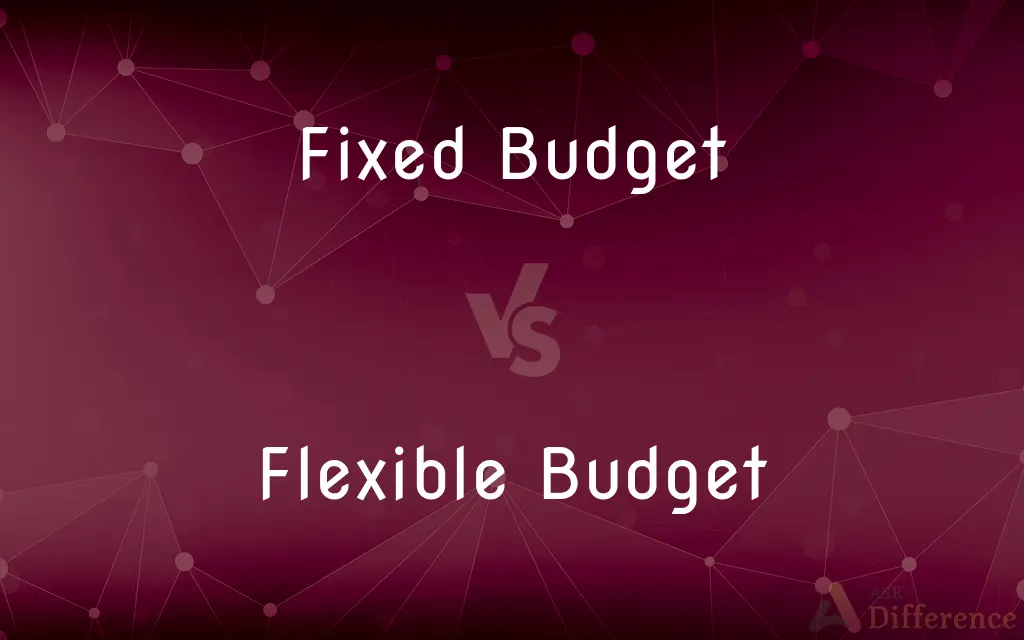Fixed Budget vs. Flexible Budget — What's the Difference?
Edited by Tayyaba Rehman — By Fiza Rafique — Published on December 5, 2023
A Fixed Budget remains constant regardless of actual activity levels, while a Flexible Budget adjusts based on actual performance or volume. Both serve as tools for financial planning and control.

Difference Between Fixed Budget and Flexible Budget
Table of Contents
ADVERTISEMENT
Key Differences
A Fixed Budget is a financial plan that doesn't change regardless of shifts in volume or activity during a specific period. On the contrary, a Flexible Budget is designed to adapt and modify according to fluctuations in activity or operational levels.
When organizations create a Fixed Budget, they're basing it on certain assumptions and projected levels of activity. This can be limiting if unexpected changes occur. Meanwhile, the Flexible Budget provides more leeway, adjusting in response to the real-time conditions and actual results of the business.
The Fixed Budget operates under the assumption that the forecast will be accurate, making it potentially less responsive to the dynamics of the business environment. On the other hand, the Flexible Budget is like a living document, adapting itself as variables such as production levels or sales volumes change.
For firms with predictable operations, a Fixed Budget might be sufficient, offering stability in planning. However, for businesses operating in volatile sectors, a Flexible Budget offers the agility to tweak the budget as realities on the ground change.
Ultimately, the choice between a Fixed Budget and a Flexible Budget depends on the nature of the business, the predictability of the industry, and management's preference for financial planning. While the Fixed option offers consistency, the Flexible one grants adaptability.
ADVERTISEMENT
Comparison Chart
Nature
Static and unchanging.
Dynamic and adjusts to actual activity.
Based On
Assumptions and projections.
Actual performance or volume.
Adaptability
Does not adapt to changes.
Changes based on actual results.
Ideal For
Predictable operations.
Volatile sectors or unpredictable operations.
Focus
Consistency in financial planning.
Agility and adaptability in financial planning.
Compare with Definitions
Fixed Budget
A budget that remains unchanged regardless of actual operations.
The company's Fixed Budget for marketing stayed at $50,000, despite the unexpected surge in sales.
Flexible Budget
An adaptable budgetary framework that aligns with actual business dynamics.
The company's Flexible Budget approach allowed for more investments in innovation during the boom cycle.
Fixed Budget
A constant budget that doesn't vary with actual results.
The department operated within its Fixed Budget despite increased demands.
Flexible Budget
A budget that adjusts according to the actual level of activity or performance.
The Flexible Budget allowed more funds for research due to the unexpected success of the product.
Fixed Budget
An unchanging financial blueprint for a set period.
The Fixed Budget for the project ensured that expenses stayed within the allocated amount.
Flexible Budget
A budget that's modifiable in response to changing operational levels.
The Flexible Budget proved advantageous when the company expanded its services unexpectedly.
Fixed Budget
A financial plan based on predetermined assumptions and projections.
Even though the event had fewer attendees, the Fixed Budget for it was not altered.
Flexible Budget
A budget that varies based on actual results or outputs.
With a Flexible Budget, the department could allocate more to advertising during peak seasons.
Fixed Budget
A static budgetary plan unaffected by actual business dynamics.
The Fixed Budget for the quarter remained at $100,000, no matter the revenue fluctuations.
Flexible Budget
A dynamic financial plan adapting to real-time business conditions.
Given the unpredictable nature of the market, the team opted for a Flexible Budget approach.
Common Curiosities
Is a Fixed Budget rigid and restrictive?
While a Fixed Budget provides consistency, it can be seen as restrictive if unexpected changes in operations occur.
What is the main difference between a Fixed Budget and a Flexible Budget?
A Fixed Budget remains unchanged regardless of actual activity, while a Flexible Budget adjusts based on actual performance.
How do organizations choose between Fixed and Flexible Budgets?
The choice often depends on the nature of the business, industry volatility, and management's financial planning preference.
Can a company switch between a Fixed Budget and a Flexible Budget?
Yes, depending on business needs and the unpredictability of the industry, a company might opt for one over the other.
What factors influence the adjustments in a Flexible Budget?
Factors can include sales volumes, production levels, market dynamics, and other operational variables.
How does a Flexible Budget respond to unexpected changes?
A Flexible Budget adjusts its allocations based on actual results or variations in activity.
Is a Fixed Budget easier to implement?
While a Fixed Budget might be simpler initially, it could require revisions if the assumptions don't align with reality.
When is a Fixed Budget most suitable?
A Fixed Budget is ideal for organizations with predictable operations and steady revenue streams.
Can a Flexible Budget lead to increased expenses?
While it adjusts to real-time conditions, proper oversight ensures a Flexible Budget stays within overall financial constraints.
Share Your Discovery

Previous Comparison
VTSMX vs. VTSAX
Next Comparison
Ideal Gas vs. Real GasAuthor Spotlight
Written by
Fiza RafiqueFiza Rafique is a skilled content writer at AskDifference.com, where she meticulously refines and enhances written pieces. Drawing from her vast editorial expertise, Fiza ensures clarity, accuracy, and precision in every article. Passionate about language, she continually seeks to elevate the quality of content for readers worldwide.
Edited by
Tayyaba RehmanTayyaba Rehman is a distinguished writer, currently serving as a primary contributor to askdifference.com. As a researcher in semantics and etymology, Tayyaba's passion for the complexity of languages and their distinctions has found a perfect home on the platform. Tayyaba delves into the intricacies of language, distinguishing between commonly confused words and phrases, thereby providing clarity for readers worldwide.











































